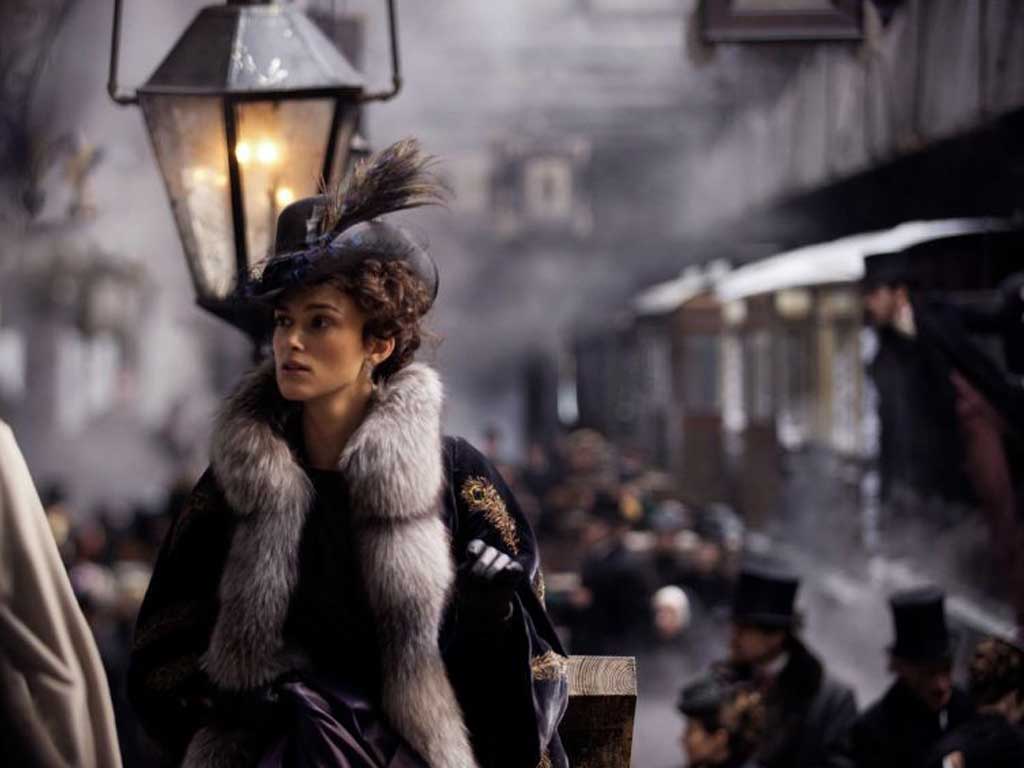From Russia with love
Keira Knightley is reunited with director Joe Wright for the latest Anna Karenina. Geoffrey Macnab looks at the enduring appeal of Tolstoy's tragic heroine

"My God, he hates her!" Keira Knightley observes of Tolstoy's attitude toward Anna Karenina. Rereading the book in preparation for playing Anna on screen in Joe Wright's new film, Knightley was struck by the sheer animosity that the Russian author had for the heroine of his novel.
Wright has taken a stylised approach to his material, setting the majority of the film in a theatre on the grounds that the Russian aristocrats "were living their lives as if they were on a stage". He has talked about the film as portraying love in all its manifestations. Knightley excels as the beautiful socialite whose destructive love affair with Count Vronsky leads eventually to her ruin and suicide.
When we first see her, she is self-assured and seemingly worldly-wise. She advises her sister-in-law Dolly (Kelly Macdonald) to stay loyal to her husband Oblonsky in spite of his philandering ways and gives Dolly's younger sister advice about how to behave at the ball.
Then Vronsky begins his aggressive courtship. Knightley expertly depicts the transformation in Anna's character: how she at first flirts with the cavalry officer and is flattered by his attention but then how she soon becomes utterly in thrall to him. She humiliates her earnest husband Karenin (Jude Law) and is in turn spurned by him.
Sales of Anna Karenina have shot up in recent years after Oprah Winfrey chose the book as Oprah's Book Club summer selection in 2004 and published articles on its feminist subtext on her website. Oprah called it "one of the greatest love stories of our time" but Keira Knightley remains intensely suspicious of the novelist's attitude toward her heroine. Tolstoy certainly doesn't give Anna an easy time of it. The book was partly inspired by a real-life incident in which a spurned woman had thrown herself underneath a train.
Tolstoy had seen her mangled corpse. "Standing in a corner of the shed, he had observed every detail of the woman's body lying on the table, bloody and mutilated, with its skull crushed," Henri Troyat writes in his biography of Tolstoy.
"How shameless, he thought, and yet how chaste. A dreadful lesson was brought home to him by that white, naked flesh, those dead breasts, those inert thighs that had felt and given pleasure. He tried to imagine the existence of this poor woman who had given all for love, only to meet with such a trite, ugly death."
Despite her chequered origins, actresses clamour to play Anna. Actresses from Greta Garbo and Vivien Leigh to Sophie Marceau as well as Knightley have appeared as the adulterous heroine on film. There have been TV versions with Helen McCrory, Nicola Pagett and Claire Bloom taking on the role.
Garbo played Anna twice, first in a 1927 silent movie called Love opposite her real-life lover John Gilbert. (The billing, predictably, read "Garbo and Gilbert in Love.")
Then, at Garbo's instigation, she reprised the role in Clarence Brown's lavish 1935 version, with Fredric March as Vronsky. Opinions are sharply divided about the film. Some see it as an exemplary vehicle for Garbo, showing off (as one critic put it), "that tragic, lonely and glamorous blend, which is the Garbo personality".
Others found it too stately and too bloodless. "Censorship would not permit warmth in the adultery," complained author David Thompson in his biography of the film's producer, David O Selznick.
The lavish costume and production design that characterised the 1948 British-made version couldn't hide the lack of emotion at its core. The producer Alexander Korda recruited the biggest name collaborators available, among them designer Cecil Beaton, playwright Jean Anouilh and actress Vivien Leigh.
There is a studied, detached quality about Leigh's Anna, very different from her Scarlett O'Hara. Her performance is far subtler than that of Garbo's tragic heroine. She excels at showing Anna's restlessness and anxiety but she is also strangely aloof. "She wanted to show me the hard, driving nature of Anna's obsession," Kieron Moore (who played Vronsky) later commented. It doesn't help that Ralph Richardson is in scene-stealing form as her cuckolded husband.
A more pared-down but fiercer Anna Karenina was directed by Rudolph Cartier for the BBC in 1961 with Claire Bloom as the ill-starred heroine and Sean Connery as Count Vronsky. This was Connery in the year before he played James Bond for the first time. Speaking in that familiar Scottish burr, he brings a scowling intensity and a sense of danger to Vronsky that many of his predecessors in the role lacked, even if he does treat Anna in the same offhand way he would later behave toward Lois Maxwell's Moneypenny.
Bernard Rose's 1997 version of the film starred Sophie Marceau as Anna and Sean Bean, fresh from playing Mellors the gamekeeper in Lady Chatterley, as Vronsky. Unlike most of the other versions (excepting Soviet director Aleksandr Zarkhi's 1967 film starring Tatiana Samoilova) it was actually made in Russia.
Yet again, critics complained about the lack of passion between the two leads. "A post-Soviet travelogue of pre-Soviet frippery," sneered The New York Times.
Now, the story is being told yet again, this time with a Tom Stoppard screenplay and the Atonement team of Keira Knightley and director Joe Wright.
Aaron Taylor-Johnson, previously seen as John Lennon in Nowhere Boy, plays Vronsky. In spite of its stylised approach, the film doesn't prettify Anna's fate at all.
Join our commenting forum
Join thought-provoking conversations, follow other Independent readers and see their replies
Comments
Bookmark popover
Removed from bookmarks